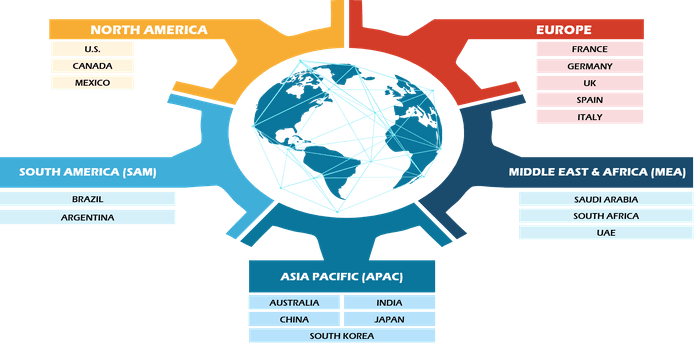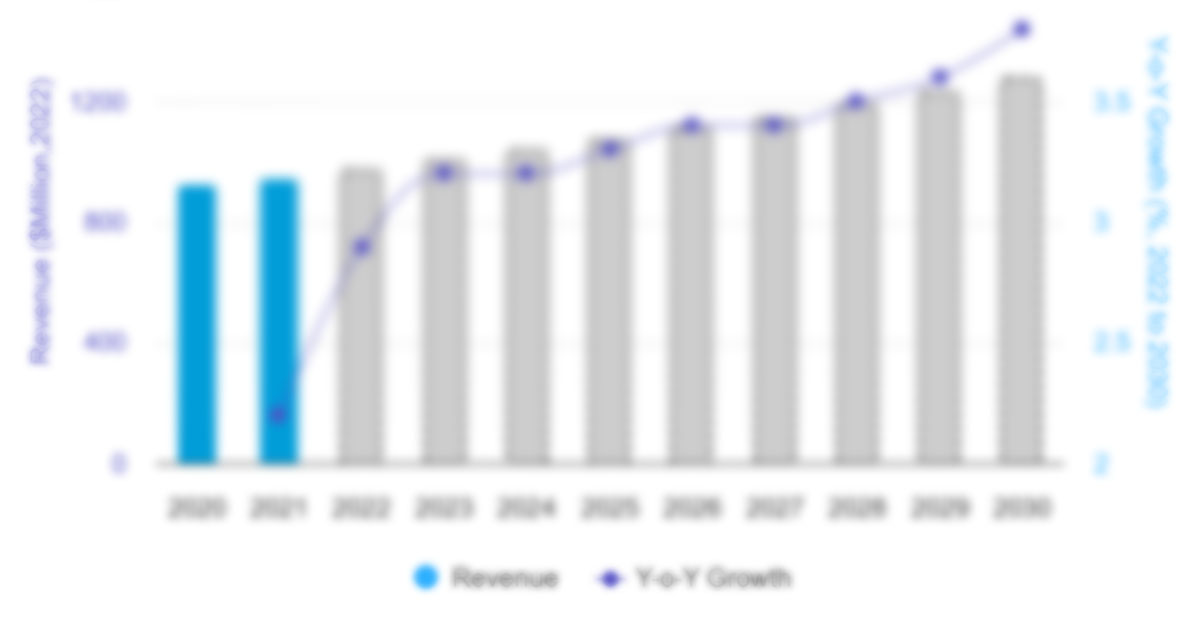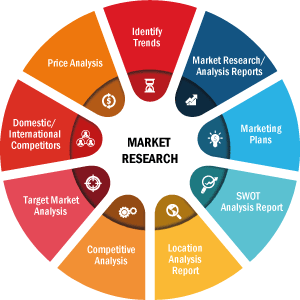The Glucagon Therapy Market is expected to register a CAGR of 6.4% from 2025 to 2031, with a market size expanding from US$ XX million in 2024 to US$ XX Million by 2031.
The report is segmented by Glucagon Therapy Market By Product Type ( Injectable Glucagon, Nasal Glucagon ); Application Type ( General Use, Emergency kit, Diagnostic and Motility, Cardiogenic Shock, Others ); End-User ( Hospitals, Speciality Clinics ), and Geography (North America, Europe, Asia Pacific, Middle East & Africa, and South & Central America). The global analysis is further broken-down at regional level and major countries. The Report Offers the Value in USD for the above analysis and segments.
Purpose of the ReportThe report Glucagon Therapy Market by The Insight Partners aims to describe the present landscape and future growth, top driving factors, challenges, and opportunities. This will provide insights to various business stakeholders, such as:
- Technology Providers/Manufacturers: To understand the evolving market dynamics and know the potential growth opportunities, enabling them to make informed strategic decisions.
- Investors: To conduct a comprehensive trend analysis regarding the market growth rate, market financial projections, and opportunities that exist across the value chain.
- Regulatory bodies: To regulate policies and police activities in the market with the aim of minimizing abuse, preserving investor trust and confidence, and upholding the integrity and stability of the market.
Glucagon Therapy Market Segmentation
Product Type- Injectable Glucagon
- Nasal Glucagon
- General Use
- Emergency kit
- Diagnostic and Motility
- Cardiogenic Shock
- Others
- Hospitals
- Speciality Clinics
- North America
- Europe
- Asia-Pacific
- South and Central America
- Middle East and Africa
Strategic Insights
Glucagon Therapy Market Growth Drivers- Increasing Prevalence of Diabetes: The market for glucagon therapy is significantly influenced by the rise of diabetes worldwide, especially type 1 and insulin-dependent type 2 diabetes. The need for efficient hypoglycemia control strategies, such as glucagon products, is growing significantly as the number of people with diabetes continues to rise.
- Growing Awareness of Hypoglycemia Management: Teaching patients, caregivers, and healthcare professionals the value of controlling hypoglycemia episodes is becoming more and more important. Increased prescription rates for glucagon medications and improved readiness among patients and their support systems are the results of this increased awareness.
- Advanced Solutions: The creation of easy-to-use glucagon delivery devices, like nasal sprays and auto-injectors, makes it easier for patients and caregivers to administer them. These developments facilitate the administration of glucagon in emergency situations, which promotes adoption. Such a factor has assisted the overall market growth in the recent past and is expected to continue a similar trend during the forecast period.
- Technological Advancements: The effectiveness of the medicine and patient compliance are being enhanced by ongoing developments in glucagon formulations and administration systems. Glucagon treatments are becoming more widely available thanks to innovations including stable liquid formulations and next-generation delivery systems. Such a factor has assisted the overall market growth in the recent past and is expected to continue a similar trend during the forecast period.
- Supportive Regulatory Environments: Glucagon is now widely acknowledged as a necessary drug for treating severe hypoglycemia. Supportive regulatory regimes speed up new glucagon product approvals and market entry, which propels the industry's expansion.Such a factor has assisted the overall market growth in the recent past and is expected to continue a similar trend during the forecast period.
- Rising Adoption in Emergency Medical Services: The significance of glucagon products in acute care situations is shown by their growing use in emergency medical settings. This tendency is especially pertinent as medical professionals look for practical ways to treat severe hypoglycemia episodes.Such a factor has assisted the overall market growth in the recent past and is expected to continue a similar trend during the forecast period.
- Focus on Pediatric Diabetes Management: The need for glucagon products made especially for pediatric usage is being driven by the increasing awareness of the necessity for efficient diabetes management techniques in children. This market category is a crucial area for expansion, which has accelerated overall market growth in the recent past
- Innovation and Research Investment: Market expansion is supported by increased financing for R&D efforts targeted at creating innovative glucagon analogues and delivery systems. Pharmaceutical firms are constantly looking for new ways to improve the efficacy of glucagon treatments. Such a factor has assisted the overall market growth in the recent past and is expected to continue a similar trend during the forecast period.
- Growing Patient Population: The prevalence of severe hypoglycemia episodes rises in tandem with the estimated 529 million people worldwide who have been diagnosed with diabetes, of whom a significant percentage have type 1 and insulin-dependent type 2 diabetes. This expands the market for glucagon products, which are necessary for treating hypoglycemia in an emergency.
Market Report Scope
Key Selling Points
- Comprehensive Coverage: The report comprehensively covers the analysis of products, services, types, and end users of the Glucagon Therapy Market, providing a holistic landscape.
- Expert Analysis: The report is compiled based on the in-depth understanding of industry experts and analysts.
- Up-to-date Information: The report assures business relevance due to its coverage of recent information and data trends.
- Customization Options: This report can be customized to cater to specific client requirements and suit the business strategies aptly.
The research report on the Glucagon Therapy Market can, therefore, help spearhead the trail of decoding and understanding the industry scenario and growth prospects. Although there can be a few valid concerns, the overall benefits of this report tend to outweigh the disadvantages.
REGIONAL FRAMEWORK
Have a question?

Mrinal
Mrinal will walk you through a 15-minute call to present the report’s content and answer all queries if you have any.
 Speak to Analyst
Speak to Analyst
- Sample PDF showcases the content structure and the nature of the information with qualitative and quantitative analysis.
- Request discounts available for Start-Ups & Universities
- Sample PDF showcases the content structure and the nature of the information with qualitative and quantitative analysis.
- Request discounts available for Start-Ups & Universities

Report Coverage
Revenue forecast, Company Analysis, Industry landscape, Growth factors, and Trends

Segment Covered
This text is related
to segments covered.

Regional Scope
North America, Europe, Asia Pacific, Middle East & Africa, South & Central America

Country Scope
This text is related
to country scope.
Frequently Asked Questions
Focus on Pediatric Diabetes Management
Budgetary Constraints
Asia Pacific region is expected to witness the highest growth during the forecast period
Europe region is expected to witness a high growth rate in terms of CAGR after Asia Pacific region during the forecast period
The Glucagon Therapy Market is estimated to witness a CAGR of 6.4% from 2023 to 2031
Increasing Prevalence of Diabetes
1. INTRODUCTION
1.1. SCOPE OF THE STUDY
1.2. THE INSIGHT PARTNERS RESEARCH REPORT GUIDANCE
1.3. MARKET SEGMENTATION
1.3.1 Glucagon Therapy Market - By Product
1.3.2 Glucagon Therapy Market - By Application Type
1.3.3 Glucagon Therapy Market - By End-User
1.3.4 Glucagon Therapy Market - By Region
1.3.4.1 By Country
2. KEY TAKEAWAYS
3. RESEARCH METHODOLOGY
4. GLUCAGON THERAPY MARKET LANDSCAPE
4.1. OVERVIEW
4.2. PEST ANALYSIS
4.2.1 North America - Pest Analysis
4.2.2 Europe - Pest Analysis
4.2.3 Asia-Pacific - Pest Analysis
4.2.4 Middle East and Africa - Pest Analysis
4.2.5 South and Central America - Pest Analysis
4.3. EXPERT OPINIONS
5. GLUCAGON THERAPY MARKET - KEY MARKET DYNAMICS
5.1. KEY MARKET DRIVERS
5.2. KEY MARKET RESTRAINTS
5.3. KEY MARKET OPPORTUNITIES
5.4. FUTURE TRENDS
5.5. IMPACT ANALYSIS OF DRIVERS AND RESTRAINTS
6. GLUCAGON THERAPY MARKET - GLOBAL MARKET ANALYSIS
6.1. GLUCAGON THERAPY - GLOBAL MARKET OVERVIEW
6.2. GLUCAGON THERAPY - GLOBAL MARKET AND FORECAST TO 2028
6.3. MARKET POSITIONING
7. GLUCAGON THERAPY MARKET - REVENUE AND FORECASTS TO 2028 – PRODUCT
7.1. OVERVIEW
7.2. PRODUCT MARKET FORECASTS AND ANALYSIS
7.3. INJECTABLE GLUCAGON
7.3.1. Overview
7.3.2. Injectable Glucagon Market Forecast and Analysis
7.4. NASAL GLUCAGON
7.4.1. Overview
7.4.2. Nasal Glucagon Market Forecast and Analysis
8. GLUCAGON THERAPY MARKET - REVENUE AND FORECASTS TO 2028 – APPLICATION TYPE
8.1. OVERVIEW
8.2. APPLICATION TYPE MARKET FORECASTS AND ANALYSIS
8.3. GENERAL USE
8.3.1. Overview
8.3.2. General Use Market Forecast and Analysis
8.4. DIAGNOSTIC AND MOBILITY
8.4.1. Overview
8.4.2. Diagnostic and Mobility Market Forecast and Analysis
8.5. CARDIOGENIC SHOCK
8.5.1. Overview
8.5.2. Cardiogenic Shock Market Forecast and Analysis
8.6. OTHERS
8.6.1. Overview
8.6.2. Others Market Forecast and Analysis
9. GLUCAGON THERAPY MARKET - REVENUE AND FORECASTS TO 2028 – END-USER
9.1. OVERVIEW
9.2. END-USER MARKET FORECASTS AND ANALYSIS
9.3. HOSPITALS
9.3.1. Overview
9.3.2. Hospitals Market Forecast and Analysis
9.4. SPECIALITY CLINICS
9.4.1. Overview
9.4.2. Speciality Clinics Market Forecast and Analysis
10. GLUCAGON THERAPY MARKET REVENUE AND FORECASTS TO 2028 – GEOGRAPHICAL ANALYSIS
10.1. NORTH AMERICA
10.1.1 North America Glucagon Therapy Market Overview
10.1.2 North America Glucagon Therapy Market Forecasts and Analysis
10.1.3 North America Glucagon Therapy Market Forecasts and Analysis - By Product
10.1.4 North America Glucagon Therapy Market Forecasts and Analysis - By Application Type
10.1.5 North America Glucagon Therapy Market Forecasts and Analysis - By End-User
10.1.6 North America Glucagon Therapy Market Forecasts and Analysis - By Countries
10.1.6.1 United States Glucagon Therapy Market
10.1.6.1.1 United States Glucagon Therapy Market by Product
10.1.6.1.2 United States Glucagon Therapy Market by Application Type
10.1.6.1.3 United States Glucagon Therapy Market by End-User
10.1.6.2 Canada Glucagon Therapy Market
10.1.6.2.1 Canada Glucagon Therapy Market by Product
10.1.6.2.2 Canada Glucagon Therapy Market by Application Type
10.1.6.2.3 Canada Glucagon Therapy Market by End-User
10.1.6.3 Mexico Glucagon Therapy Market
10.1.6.3.1 Mexico Glucagon Therapy Market by Product
10.1.6.3.2 Mexico Glucagon Therapy Market by Application Type
10.1.6.3.3 Mexico Glucagon Therapy Market by End-User
10.2. EUROPE
10.2.1 Europe Glucagon Therapy Market Overview
10.2.2 Europe Glucagon Therapy Market Forecasts and Analysis
10.2.3 Europe Glucagon Therapy Market Forecasts and Analysis - By Product
10.2.4 Europe Glucagon Therapy Market Forecasts and Analysis - By Application Type
10.2.5 Europe Glucagon Therapy Market Forecasts and Analysis - By End-User
10.2.6 Europe Glucagon Therapy Market Forecasts and Analysis - By Countries
10.2.6.1 Germany Glucagon Therapy Market
10.2.6.1.1 Germany Glucagon Therapy Market by Product
10.2.6.1.2 Germany Glucagon Therapy Market by Application Type
10.2.6.1.3 Germany Glucagon Therapy Market by End-User
10.2.6.2 France Glucagon Therapy Market
10.2.6.2.1 France Glucagon Therapy Market by Product
10.2.6.2.2 France Glucagon Therapy Market by Application Type
10.2.6.2.3 France Glucagon Therapy Market by End-User
10.2.6.3 Italy Glucagon Therapy Market
10.2.6.3.1 Italy Glucagon Therapy Market by Product
10.2.6.3.2 Italy Glucagon Therapy Market by Application Type
10.2.6.3.3 Italy Glucagon Therapy Market by End-User
10.2.6.4 Spain Glucagon Therapy Market
10.2.6.4.1 Spain Glucagon Therapy Market by Product
10.2.6.4.2 Spain Glucagon Therapy Market by Application Type
10.2.6.4.3 Spain Glucagon Therapy Market by End-User
10.2.6.5 United Kingdom Glucagon Therapy Market
10.2.6.5.1 United Kingdom Glucagon Therapy Market by Product
10.2.6.5.2 United Kingdom Glucagon Therapy Market by Application Type
10.2.6.5.3 United Kingdom Glucagon Therapy Market by End-User
10.2.6.6 Rest of Europe Glucagon Therapy Market
10.2.6.6.1 Rest of Europe Glucagon Therapy Market by Product
10.2.6.6.2 Rest of Europe Glucagon Therapy Market by Application Type
10.2.6.6.3 Rest of Europe Glucagon Therapy Market by End-User
10.3. ASIA-PACIFIC
10.3.1 Asia-Pacific Glucagon Therapy Market Overview
10.3.2 Asia-Pacific Glucagon Therapy Market Forecasts and Analysis
10.3.3 Asia-Pacific Glucagon Therapy Market Forecasts and Analysis - By Product
10.3.4 Asia-Pacific Glucagon Therapy Market Forecasts and Analysis - By Application Type
10.3.5 Asia-Pacific Glucagon Therapy Market Forecasts and Analysis - By End-User
10.3.6 Asia-Pacific Glucagon Therapy Market Forecasts and Analysis - By Countries
10.3.6.1 Australia Glucagon Therapy Market
10.3.6.1.1 Australia Glucagon Therapy Market by Product
10.3.6.1.2 Australia Glucagon Therapy Market by Application Type
10.3.6.1.3 Australia Glucagon Therapy Market by End-User
10.3.6.2 China Glucagon Therapy Market
10.3.6.2.1 China Glucagon Therapy Market by Product
10.3.6.2.2 China Glucagon Therapy Market by Application Type
10.3.6.2.3 China Glucagon Therapy Market by End-User
10.3.6.3 India Glucagon Therapy Market
10.3.6.3.1 India Glucagon Therapy Market by Product
10.3.6.3.2 India Glucagon Therapy Market by Application Type
10.3.6.3.3 India Glucagon Therapy Market by End-User
10.3.6.4 Japan Glucagon Therapy Market
10.3.6.4.1 Japan Glucagon Therapy Market by Product
10.3.6.4.2 Japan Glucagon Therapy Market by Application Type
10.3.6.4.3 Japan Glucagon Therapy Market by End-User
10.3.6.5 South Korea Glucagon Therapy Market
10.3.6.5.1 South Korea Glucagon Therapy Market by Product
10.3.6.5.2 South Korea Glucagon Therapy Market by Application Type
10.3.6.5.3 South Korea Glucagon Therapy Market by End-User
10.3.6.6 Rest of Asia-Pacific Glucagon Therapy Market
10.3.6.6.1 Rest of Asia-Pacific Glucagon Therapy Market by Product
10.3.6.6.2 Rest of Asia-Pacific Glucagon Therapy Market by Application Type
10.3.6.6.3 Rest of Asia-Pacific Glucagon Therapy Market by End-User
10.4. MIDDLE EAST AND AFRICA
10.4.1 Middle East and Africa Glucagon Therapy Market Overview
10.4.2 Middle East and Africa Glucagon Therapy Market Forecasts and Analysis
10.4.3 Middle East and Africa Glucagon Therapy Market Forecasts and Analysis - By Product
10.4.4 Middle East and Africa Glucagon Therapy Market Forecasts and Analysis - By Application Type
10.4.5 Middle East and Africa Glucagon Therapy Market Forecasts and Analysis - By End-User
10.4.6 Middle East and Africa Glucagon Therapy Market Forecasts and Analysis - By Countries
10.4.6.1 South Africa Glucagon Therapy Market
10.4.6.1.1 South Africa Glucagon Therapy Market by Product
10.4.6.1.2 South Africa Glucagon Therapy Market by Application Type
10.4.6.1.3 South Africa Glucagon Therapy Market by End-User
10.4.6.2 Saudi Arabia Glucagon Therapy Market
10.4.6.2.1 Saudi Arabia Glucagon Therapy Market by Product
10.4.6.2.2 Saudi Arabia Glucagon Therapy Market by Application Type
10.4.6.2.3 Saudi Arabia Glucagon Therapy Market by End-User
10.4.6.3 U.A.E Glucagon Therapy Market
10.4.6.3.1 U.A.E Glucagon Therapy Market by Product
10.4.6.3.2 U.A.E Glucagon Therapy Market by Application Type
10.4.6.3.3 U.A.E Glucagon Therapy Market by End-User
10.4.6.4 Rest of Middle East and Africa Glucagon Therapy Market
10.4.6.4.1 Rest of Middle East and Africa Glucagon Therapy Market by Product
10.4.6.4.2 Rest of Middle East and Africa Glucagon Therapy Market by Application Type
10.4.6.4.3 Rest of Middle East and Africa Glucagon Therapy Market by End-User
10.5. SOUTH AND CENTRAL AMERICA
10.5.1 South and Central America Glucagon Therapy Market Overview
10.5.2 South and Central America Glucagon Therapy Market Forecasts and Analysis
10.5.3 South and Central America Glucagon Therapy Market Forecasts and Analysis - By Product
10.5.4 South and Central America Glucagon Therapy Market Forecasts and Analysis - By Application Type
10.5.5 South and Central America Glucagon Therapy Market Forecasts and Analysis - By End-User
10.5.6 South and Central America Glucagon Therapy Market Forecasts and Analysis - By Countries
10.5.6.1 Brazil Glucagon Therapy Market
10.5.6.1.1 Brazil Glucagon Therapy Market by Product
10.5.6.1.2 Brazil Glucagon Therapy Market by Application Type
10.5.6.1.3 Brazil Glucagon Therapy Market by End-User
10.5.6.2 Argentina Glucagon Therapy Market
10.5.6.2.1 Argentina Glucagon Therapy Market by Product
10.5.6.2.2 Argentina Glucagon Therapy Market by Application Type
10.5.6.2.3 Argentina Glucagon Therapy Market by End-User
10.5.6.3 Rest of South and Central America Glucagon Therapy Market
10.5.6.3.1 Rest of South and Central America Glucagon Therapy Market by Product
10.5.6.3.2 Rest of South and Central America Glucagon Therapy Market by Application Type
10.5.6.3.3 Rest of South and Central America Glucagon Therapy Market by End-User
11. IMPACT OF COVID-19 PANDEMIC ON GLOBAL GLUCAGON THERAPY MARKET
11.1 North America
11.2 Europe
11.3 Asia-Pacific
11.4 Middle East and Africa
11.5 South and Central America
12. INDUSTRY LANDSCAPE
12.1. MERGERS AND ACQUISITIONS
12.2. AGREEMENTS, COLLABORATIONS AND JOIN VENTURES
12.3. NEW PRODUCT LAUNCHES
12.4. EXPANSIONS AND OTHER STRATEGIC DEVELOPMENTS
13. GLUCAGON THERAPY MARKET, KEY COMPANY PROFILES
13.1. XERIS PHARMACEUTICALS INC.
13.1.1. Key Facts
13.1.2. Business Description
13.1.3. Products and Services
13.1.4. Financial Overview
13.1.5. SWOT Analysis
13.1.6. Key Developments
13.2. SVAR LIFE SCIENCE AB
13.2.1. Key Facts
13.2.2. Business Description
13.2.3. Products and Services
13.2.4. Financial Overview
13.2.5. SWOT Analysis
13.2.6. Key Developments
13.3. NOVO NORDISK A/S
13.3.1. Key Facts
13.3.2. Business Description
13.3.3. Products and Services
13.3.4. Financial Overview
13.3.5. SWOT Analysis
13.3.6. Key Developments
13.4. LILLY
13.4.1. Key Facts
13.4.2. Business Description
13.4.3. Products and Services
13.4.4. Financial Overview
13.4.5. SWOT Analysis
13.4.6. Key Developments
13.5. TAJ PHARMACEUTICALS LTD.
13.5.1. Key Facts
13.5.2. Business Description
13.5.3. Products and Services
13.5.4. Financial Overview
13.5.5. SWOT Analysis
13.5.6. Key Developments
13.6. FRESENIUS SE AND CO. KGAA
13.6.1. Key Facts
13.6.2. Business Description
13.6.3. Products and Services
13.6.4. Financial Overview
13.6.5. SWOT Analysis
13.6.6. Key Developments
13.7. TORRENT PHARMACEUTICALS LTD
13.7.1. Key Facts
13.7.2. Business Description
13.7.3. Products and Services
13.7.4. Financial Overview
13.7.5. SWOT Analysis
13.7.6. Key Developments
13.8. FEROZSONS LABORATORIES LIMITED
13.8.1. Key Facts
13.8.2. Business Description
13.8.3. Products and Services
13.8.4. Financial Overview
13.8.5. SWOT Analysis
13.8.6. Key Developments
13.9. ZEALAND PHARMA A/S
13.9.1. Key Facts
13.9.2. Business Description
13.9.3. Products and Services
13.9.4. Financial Overview
13.9.5. SWOT Analysis
13.9.6. Key Developments
13.10. AMPHASTAR PHARMACEUTICALS, INC
13.10.1. Key Facts
13.10.2. Business Description
13.10.3. Products and Services
13.10.4. Financial Overview
13.10.5. SWOT Analysis
13.10.6. Key Developments
14. APPENDIX
14.1. ABOUT THE INSIGHT PARTNERS
14.2. GLOSSARY OF TERMS
The List of Companies
1. Xeris Pharmaceuticals Inc.
2. Svar Life Science AB
3. Novo Nordisk A/S
4. Lilly
5. Taj Pharmaceuticals Ltd
6. Fresenius SE and Co. KGaA
7. Torrent Pharmaceuticals Ltd
8. Ferozsons Laboratories Limited
9. Zealand Pharma A/S
10. Amphastar Pharmaceuticals, Inc
The Insight Partners performs research in 4 major stages: Data Collection & Secondary Research, Primary Research, Data Analysis and Data Triangulation & Final Review.
- Data Collection and Secondary Research:
As a market research and consulting firm operating from a decade, we have published many reports and advised several clients across the globe. First step for any study will start with an assessment of currently available data and insights from existing reports. Further, historical and current market information is collected from Investor Presentations, Annual Reports, SEC Filings, etc., and other information related to company’s performance and market positioning are gathered from Paid Databases (Factiva, Hoovers, and Reuters) and various other publications available in public domain.
Several associations trade associates, technical forums, institutes, societies and organizations are accessed to gain technical as well as market related insights through their publications such as research papers, blogs and press releases related to the studies are referred to get cues about the market. Further, white papers, journals, magazines, and other news articles published in the last 3 years are scrutinized and analyzed to understand the current market trends.
- Primary Research:
The primarily interview analysis comprise of data obtained from industry participants interview and answers to survey questions gathered by in-house primary team.
For primary research, interviews are conducted with industry experts/CEOs/Marketing Managers/Sales Managers/VPs/Subject Matter Experts from both demand and supply side to get a 360-degree view of the market. The primary team conducts several interviews based on the complexity of the markets to understand the various market trends and dynamics which makes research more credible and precise.
A typical research interview fulfils the following functions:
- Provides first-hand information on the market size, market trends, growth trends, competitive landscape, and outlook
- Validates and strengthens in-house secondary research findings
- Develops the analysis team’s expertise and market understanding
Primary research involves email interactions and telephone interviews for each market, category, segment, and sub-segment across geographies. The participants who typically take part in such a process include, but are not limited to:
- Industry participants: VPs, business development managers, market intelligence managers and national sales managers
- Outside experts: Valuation experts, research analysts and key opinion leaders specializing in the electronics and semiconductor industry.
Below is the breakup of our primary respondents by company, designation, and region:

Once we receive the confirmation from primary research sources or primary respondents, we finalize the base year market estimation and forecast the data as per the macroeconomic and microeconomic factors assessed during data collection.
- Data Analysis:
Once data is validated through both secondary as well as primary respondents, we finalize the market estimations by hypothesis formulation and factor analysis at regional and country level.
- 3.1 Macro-Economic Factor Analysis:
We analyse macroeconomic indicators such the gross domestic product (GDP), increase in the demand for goods and services across industries, technological advancement, regional economic growth, governmental policies, the influence of COVID-19, PEST analysis, and other aspects. This analysis aids in setting benchmarks for various nations/regions and approximating market splits. Additionally, the general trend of the aforementioned components aid in determining the market's development possibilities.
- 3.2 Country Level Data:
Various factors that are especially aligned to the country are taken into account to determine the market size for a certain area and country, including the presence of vendors, such as headquarters and offices, the country's GDP, demand patterns, and industry growth. To comprehend the market dynamics for the nation, a number of growth variables, inhibitors, application areas, and current market trends are researched. The aforementioned elements aid in determining the country's overall market's growth potential.
- 3.3 Company Profile:
The “Table of Contents” is formulated by listing and analyzing more than 25 - 30 companies operating in the market ecosystem across geographies. However, we profile only 10 companies as a standard practice in our syndicate reports. These 10 companies comprise leading, emerging, and regional players. Nonetheless, our analysis is not restricted to the 10 listed companies, we also analyze other companies present in the market to develop a holistic view and understand the prevailing trends. The “Company Profiles” section in the report covers key facts, business description, products & services, financial information, SWOT analysis, and key developments. The financial information presented is extracted from the annual reports and official documents of the publicly listed companies. Upon collecting the information for the sections of respective companies, we verify them via various primary sources and then compile the data in respective company profiles. The company level information helps us in deriving the base number as well as in forecasting the market size.
- 3.4 Developing Base Number:
Aggregation of sales statistics (2020-2022) and macro-economic factor, and other secondary and primary research insights are utilized to arrive at base number and related market shares for 2022. The data gaps are identified in this step and relevant market data is analyzed, collected from paid primary interviews or databases. On finalizing the base year market size, forecasts are developed on the basis of macro-economic, industry and market growth factors and company level analysis.
- Data Triangulation and Final Review:
The market findings and base year market size calculations are validated from supply as well as demand side. Demand side validations are based on macro-economic factor analysis and benchmarks for respective regions and countries. In case of supply side validations, revenues of major companies are estimated (in case not available) based on industry benchmark, approximate number of employees, product portfolio, and primary interviews revenues are gathered. Further revenue from target product/service segment is assessed to avoid overshooting of market statistics. In case of heavy deviations between supply and demand side values, all thes steps are repeated to achieve synchronization.
We follow an iterative model, wherein we share our research findings with Subject Matter Experts (SME’s) and Key Opinion Leaders (KOLs) until consensus view of the market is not formulated – this model negates any drastic deviation in the opinions of experts. Only validated and universally acceptable research findings are quoted in our reports.
We have important check points that we use to validate our research findings – which we call – data triangulation, where we validate the information, we generate from secondary sources with primary interviews and then we re-validate with our internal data bases and Subject matter experts. This comprehensive model enables us to deliver high quality, reliable data in shortest possible time.



 Get Free Sample For
Get Free Sample For